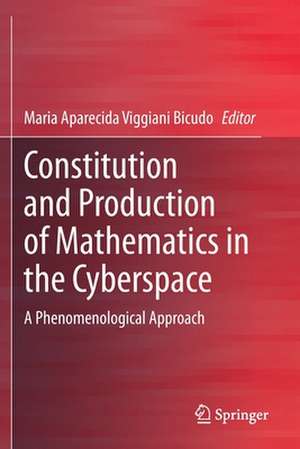Constitution and Production of Mathematics in the Cyberspace: A Phenomenological Approach
Editat de Maria Aparecida Viggiani Bicudoen Limba Engleză Paperback – 30 apr 2021
The aim of this book is not to explain the tools used and how one works with them in the cyberspace, aiming at better teaching and learning mathematics. Its purpose is to present philosophical investigations that contribute to the understanding of the complexity of the world in which we are being researchers and mathematics teachers.
By doing so, Constitution and Production of Mathematics in the Cyberspace – A Phenomenological Approach will help researchers and mathematics teachers understand their role in a world in which the experience of teaching and learning mathematics is being radically changed by new technologies and new ways of being in this world.
| Toate formatele și edițiile | Preț | Express |
|---|---|---|
| Paperback (1) | 883.73 lei 6-8 săpt. | |
| Springer International Publishing – 30 apr 2021 | 883.73 lei 6-8 săpt. | |
| Hardback (1) | 895.09 lei 6-8 săpt. | |
| Springer International Publishing – 30 apr 2020 | 895.09 lei 6-8 săpt. |
Preț: 883.73 lei
Preț vechi: 1077.72 lei
-18% Nou
Puncte Express: 1326
Preț estimativ în valută:
169.12€ • 174.71$ • 140.75£
169.12€ • 174.71$ • 140.75£
Carte tipărită la comandă
Livrare economică 26 martie-09 aprilie
Preluare comenzi: 021 569.72.76
Specificații
ISBN-13: 9783030422448
ISBN-10: 3030422445
Ilustrații: XIV, 259 p. 17 illus., 10 illus. in color.
Dimensiuni: 155 x 235 mm
Greutate: 0.39 kg
Ediția:1st ed. 2020
Editura: Springer International Publishing
Colecția Springer
Locul publicării:Cham, Switzerland
ISBN-10: 3030422445
Ilustrații: XIV, 259 p. 17 illus., 10 illus. in color.
Dimensiuni: 155 x 235 mm
Greutate: 0.39 kg
Ediția:1st ed. 2020
Editura: Springer International Publishing
Colecția Springer
Locul publicării:Cham, Switzerland
Cuprins
Chapter 1. MATHEMATICS EDUCATION IN/WITH CYBERSPACE AND DIGITAL TECHNOLOGIES: WHAT HAS BEEN SCIENTIFICALLY PRODUCED ABOUT IT.- Chapter 2. THE VIEW OF THE WORLD AND OF KNOWLEDGE MADE EXPLICIT BY PHENOMENOLOGY: A TURNING POINT IN THE WAY OF UNDERSTANDING REALITY.- Chapter 3. THE LIVING BODY AND CYBERSPACE: THE HYLETIC DIMENSION IN THE CONSTITUTION OF KNOWLEDGE.- Chapter 4. UNDERSTANDING PHENOMENOLOGICALLY THE CONSTITUTION OF KNOWLEDGE WHEN WORKING WITH DYNAMIC GEOMETRY.- Chapter 5. CONSTITUING MATHEMATICAL KNOWLEDGE BEING-WITH-MEDIA IN CYBERSPACE.- Chapter 6. PHENOMENOLOGICAL STUDY OF A DIGITAL SIMULATOR OF THE SINE FUNCTION CONTEXTUALIZED IN A TEACHING AND LEARNING ACTIVITY.- Chapter 7. RESOURCE AND WEBSITE DEVELOPERS FOR TEACHING MATHEMATICS ON THE INTERNET.- Chapter 8. CYBEREDUCATION WITH MATHEMATICS TEACHERS: WORKING WITH VIRTUAL REALITY IN MATHEMATICS ACTIVITIES.- Chapter 9. MATHEMATICS IN AFRICAN CULTURAL CREATIONS: OPEN HORIZONS TO THE WORLD OF MATHEMATICS EDUCATION AND THE FORMATION OF THE PERSON.- Chapter 10. FAMILIARITY-STRANGENESS: MOVEMENTS ACTUALIZATION OF A PROJECT OF MATHEMATICS TEACHERS TECHNOLOGICAL FORMATION.- Chapter 11. INTERACTIVITY AS A WAY TO EXPRESS AND LEARN MATHEMATICAL IDEAS ABOUT CHANGE, DEPENDENCY AND RESTRICTION.- Chapter 12. REAL NUMBERS AND COMPUTATIONAL CHALLENGES UNDER A PHENOMENOLOGICAL PERSPECTIVE.- Chapter 13. THE MATHEMATICIAN PRODUCING MATHEMATICS (BEING) WITH COMPUTERS.- Chapter 14. THE CONSTITUTION OF THE MATHEMATICAL OBJECT IN ACTS OF EVIDENCE, FROM THE PERSPECTIVE OF EDMUND HUSSERL’S FIRST LOGICAL INVESTIGATION.- Chapter 15. Afterwords.
Notă biografică
Maria Aparecida Viggiani Bicudo is full professor of Philosophy of Education at the Universidade Estadual Paulista Júlio de Mesquita Filho (UNESP), Brazil; professor in the Graduate Program in Mathematics Education at the same institution, Research Fellow at the at the University of California, Berkeley, and Invited Professor at the Facoltà di Filosofiadell'Università Lateranense di Roma. Dr. Bicudo is also president of the Society of Qualitative Studies and Research in Brazil. Her main topics of research are mathematics education, phenomenology and philosophy of mathematics education.
Textul de pe ultima copertă
This book brings together various studies that assume phenomenology to analyze how mathematics education is affected by the experience of being in the cyberspace. The authors of the chapters included in this contributed volume work with the theoretical framework developed by authors such as Edmund Husserl, Martin Heidegger and Maurice Merleau-Ponty to investigate how mathematics is produced and comprehended in a new way of being in the world, with digital technologies.
The aim of this book is not to explain the tools used and how one works with them in the cyberspace, aiming at better teaching and learning mathematics. Its purpose is to present philosophical investigations that contribute to the understanding of the complexity of the world in which we are being researchers and mathematics teachers.By doing so, Constitution and Production of Mathematics in the Cyberspace – A Phenomenological Approach will help researchers and mathematics teachers understand their role in a world in which the experience of teaching and learning mathematics is being radically changed by new technologies and new ways of being in this world.
The aim of this book is not to explain the tools used and how one works with them in the cyberspace, aiming at better teaching and learning mathematics. Its purpose is to present philosophical investigations that contribute to the understanding of the complexity of the world in which we are being researchers and mathematics teachers.By doing so, Constitution and Production of Mathematics in the Cyberspace – A Phenomenological Approach will help researchers and mathematics teachers understand their role in a world in which the experience of teaching and learning mathematics is being radically changed by new technologies and new ways of being in this world.
Caracteristici
Presents philosophical investigations of the new ways of teaching, learning and producing mathematics in the cyberspace Shows how phenomenology can be assumed to philosophy of mathematics education Helps teachers understand how the experience of teaching and learning mathematics is being changed by new technologies
